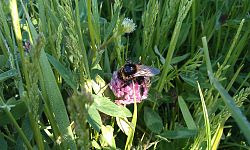

A species of bee which has been extinct on our shores for a quarter of a century has been introduced into the wild.
Around 100 short-haired bees have been brought across from Sweden to repopulate areas where they have previously inhabited. 50 of the healthiest were released at the RSPB's Dungeness reserve in Kent, an area near to where they were last recorded living in the wild in 1988. The aim is that the bees will create new colonies, feed off the red clover flowers and eventually expand into other parts across the country.
Project officer Dr Nikki Gammons said, "It's a really exciting new scientific procedure, something which hasn't been attempted before with bumblebees. It's very exciting for the bee species to get a second chance."
The short-haired bee population has declined rapidly over the last 60 years, mainly as a result of a loss of habitat. Some 100 bees were captured from Skane in southern Sweden in April using bee nets, as part of a Natural England-backed Species Recovery Programme. The programme also involved the RSPB, Hymettus and the Bumblebee Conservation Trust, and has been used in the past to successfully reintroduce the red kite and the large blue butterfly.
The captured bees were placed in temporary hibernation and were brought over to a quarantine facility at the Royal Holloway University in Surrey, where they were examined before being released.
Editor's note
Image courtesy of the Bumblebee Conservation Trust's Twitter feed. Follow them @BumblebeeTrust.